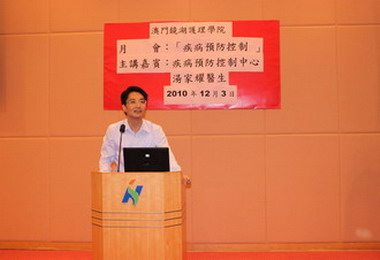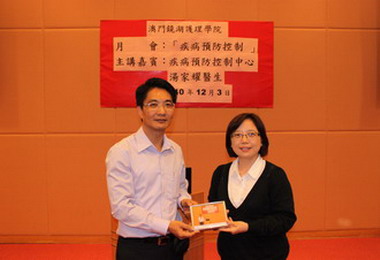Theme Talk on Disease Control and Prevention
to Enhance Awareness among Faculty and Students
With rapid development of society, environmental changes and population aging, new infectious disease recurrent infectious disease and chronic disease have posed a grave threat to the planet people’s health. According to the DSEC statistics, the fundamental causes of death in Macau recorded in the 3rd quarter 2010 are cancers, circulatory disease and respiratory disease. Since the breakout of dengue fever in 2001 and SARS in 2003, the first case of aviation flu in 2003 and prevalence of swine flu in 2009, there have been great challenges one after another for the medical and health decision maker of Macau. In order to raise students’ awareness of the work and policies of the Macau Centre for Disease Control and Prevention, Kiang Wu Nursing College of Macau organized a theme talk lecture on the topic of “Disease Prevention and Control” on Dec. 3. Coordinator Dr. Tong Ka Io of Macau CDC Health Bureau was invited to give a speech to over 200 faculty members and students at the convocation presided by Lecturer Selwynne Cheong and student Cheng Ho Kei.
Established in 2001, the Macau CDC is a specific responsible department to lead local public health related work and strategies. According to Dr. Tong, Macau CDC has to participate in and implement various functions under Health Bureau in respect of health promotion and protection, disease prevention as well as overall planning for practicing disease control and prevention in group level. Its focal work includes epidemic disease control and prevention, health promotion and food safety. Since public health is not facing individual clients but a whole community or a specific group which is quite different from other medical organizations, the Macau CDC bearing various basic public health functions is also subject to possible global threats, such as prevalence of influenza, SARS, aviation flu, etc., as CDC of other areas do. In view of the less developed scale and level comparing to other advanced areas, the Macau CDC have to make full use of information and technology to set up a stable information/decision making/action system to collect the latest situation in other areas, develop collaborative project, make timely decision and take actions.
In Macau, the causes of death from infectious diseases have been on the drop for the past decades while those of chronic diseases have been on the rise. Dr. Tong indicated that the weakest points for Macau in facing epidemic diseases are the high density of population, numerous tourists, population aging, some unhealthy habits and behaviors of residents, etc. which would seriously affect people’s health and cause social and economic problems. Therefore it is the source of infection and dissemination channel the CDC has to control and smash up while the easily-infected groups are being protected and a great many policies should be set up to tackle different infectious diseases. In this connection, CDC will put emphasis on a good communication mechanism and monitoring, depending on active participation of various organizations and schools.
While chronic diseases are dominating the disease family, the non-communicable chronic diseases has been a major factor for lost of quality of population life. As we know, unhealthy living habits or addiction of individuals such as smoking as well as obesity, environmental pollution, population aging and medical services, etc. are closely linked to chronic diseases. Three-level prevention measure may be effective to deal with the problem. The effects have been found in many medical units of Macau, such as clinical prevention, early finding in diseases and appropriate treatment, rehabilitation, disability support, publicity and education, etc. Yet, smoking control ,for instance, is a profound social struggle, not easy to solve simply by medical workers. But the medical worker is encouraged to be a good example in front of citizens. Development of a healthy school is very important in pushing forward a healthy city policy. Dr. Tong thus suggested KWNC may create opportunity for students and indoctrinate this idea to students by programmes. “Prevention is better than cure”, as professional we have to education citizens with positive attitude towards vaccination injection and correct their misunderstanding of it, such as towards HIN1 (swine) flu vaccination.
Finally Dr. Tong pointed out that a doctor’s profession is to cure with benevolence who always keeps a benevolent heart. In public health, there are five roles for nursing workers: People’s health always goes first; work hard in dedication to everyone’s health and get mastery of medical prevention skills while learning clinical knowledge; student nurses take part in collaborative work with different personnel to ensure common protection of human health; clients are main bodies of prevention work, so it is important to inspire their effective and active coordination; scientific evidence and clinical data as well as patients value should be integrated for clinical decision making.
As members of a tertiary education institution that cultivates nursing talents, the KWNC students will be a major part of the future medical system, a key role of educator and performer played in disease control and prevention work. The College puts great emphasis on teaching students the ideas on pushing disease control and prevention by organizing relevant education lectures in elderly homes, institutions and schools conducted by students. Problem Solving for Better Health, one of the health promotion projects, is aiming to train participants’ decision making abilities to tackle with health problems and small cases, better use the existent resources to solve health problems.

